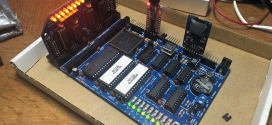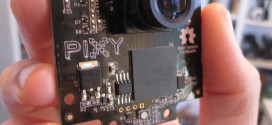 The Mindsensors PCF8574A board is not just suitable for making das Blinkenlights but also for controlling other ICs. I recently thought of how I could use my old 9V motors with my NXT using a dual H-Bridge IC such as the SN754410. This IC is pin compatible with the very popular L293D and has the same clamping diodes built-in. It is, however, much beefier than the L293D and can handle much higher loads.
The Mindsensors PCF8574A board is not just suitable for making das Blinkenlights but also for controlling other ICs. I recently thought of how I could use my old 9V motors with my NXT using a dual H-Bridge IC such as the SN754410. This IC is pin compatible with the very popular L293D and has the same clamping diodes built-in. It is, however, much beefier than the L293D and can handle much higher loads.
 In this setup I am using two buttons to control the program on the NXT. I have a direction button (SW2) and a disable/enable button (SW1). The former controls the direction of the motor and the latter the braking of the motor. When the direction button is pressed, the motor will toggle between left and right rotation. When the disable/enable button is pressed, the motor is toggled off and on. The current program is configured to stop the motor by allowing it to coast. A simple programmatic change would enable dynamic braking. If you are not looking to allow your motor to coast to a stop, you can forego the extra pin needed to toggle the EN pin on the H Bridge and add a 10K pull-up resistor to that port. That would allow you to potentially connect two dual H-Bridge ICs and control 4 motors at once! I’ve also tested this circuit with the new style 9V motors. You have to be very careful with those, though. According to some tests, they can pull up to 3.2A when stalled. More information on the various Lego motors and their properties can be found here: LINK.
In this setup I am using two buttons to control the program on the NXT. I have a direction button (SW2) and a disable/enable button (SW1). The former controls the direction of the motor and the latter the braking of the motor. When the direction button is pressed, the motor will toggle between left and right rotation. When the disable/enable button is pressed, the motor is toggled off and on. The current program is configured to stop the motor by allowing it to coast. A simple programmatic change would enable dynamic braking. If you are not looking to allow your motor to coast to a stop, you can forego the extra pin needed to toggle the EN pin on the H Bridge and add a 10K pull-up resistor to that port. That would allow you to potentially connect two dual H-Bridge ICs and control 4 motors at once! I’ve also tested this circuit with the new style 9V motors. You have to be very careful with those, though. According to some tests, they can pull up to 3.2A when stalled. More information on the various Lego motors and their properties can be found here: LINK.
You can find the source for this program here: LINK.
I’ve made a short video demonstrating the setup. This time I’ve even included a voice over!!
 Bot Bench I'd Rather Be Building Robots
Bot Bench I'd Rather Be Building Robots




[…] under: Experiments, Sensors — Xander @ 20:40 If you’ve been reading my articles (1, 2) on the Mindsensors PCF8574A board but are unable to purchase one for any number of reasons, […]